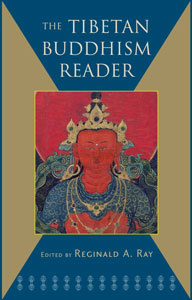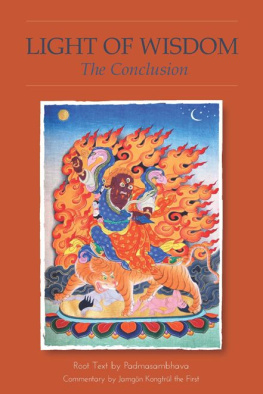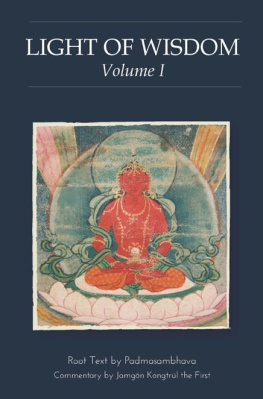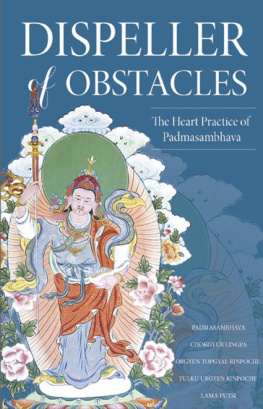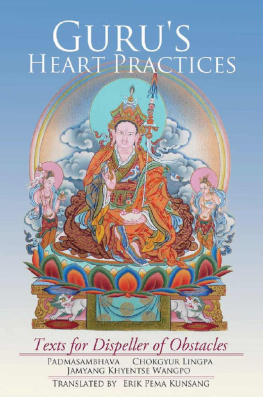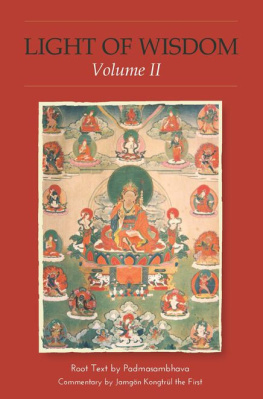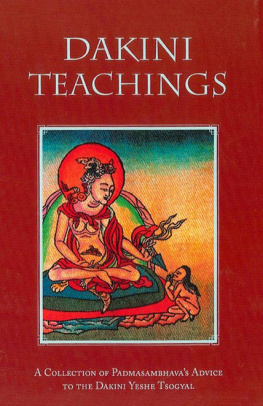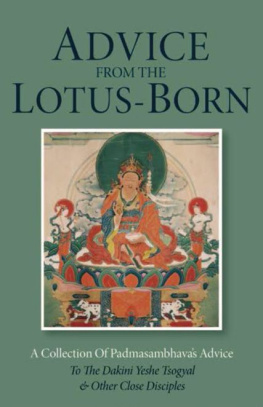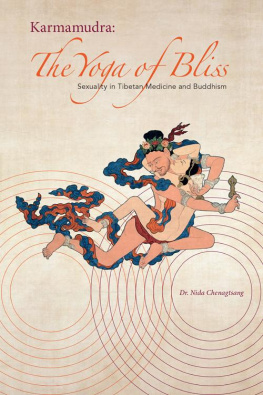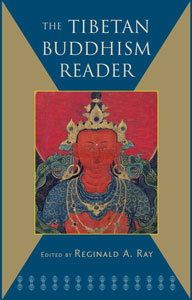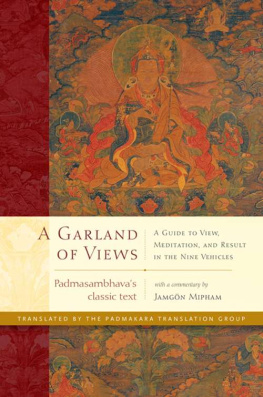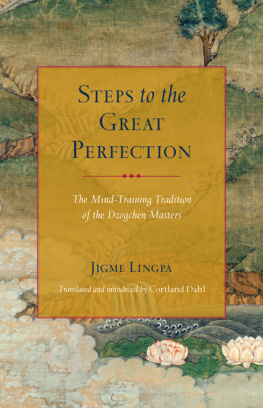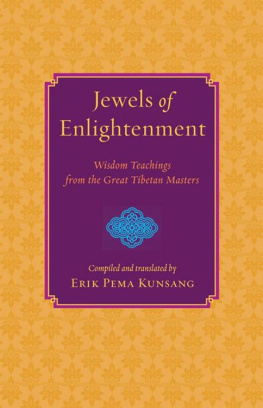This volume nicely presents translations and commentary on a text from the Dzogchen Quintessential (nyingthig) cycle of Padmasambhava, dealing with yogic energies. It explores three key questions: what is the natural energy of the cosmos, how is this energy present in our human embodiment, and what role does sexuality play in healing and liberation? The translator, Kennard Lipman, is a seasoned scholar of Tibetan Buddhist texts who is also trained in traditional Chinese medicine. I recommend this work to scholars and yogis alike.
Steven Goodman, professor of Asian and Comparative Studies, California Institute of Integral Studies
Here are Guru Rinpoches precious words, sacred and secret, to be sealed in the heart, where, nourished by further commentary, they can become a basis for even greater understanding.
Anne C. Klein, professor, Rice University, and translator of Heart Essence of the Vast Expanse
ABOUT THE BOOK
These Tibetan Buddhist teachings provide instructions for gathering and harnessing basic life energy. According to the tradition, a very effective way to do this is to arouse sexual energy and to direct the essence of that energy toward spiritual realization. According to the philosophy, sexual energy brings one naturally and effortlessly into flow with creativity and awareness in both mind and bodywhen used skillfully by committed practitioners with appropriate training.
These ancient texts, attributed to the great Tibetan meditation master Padmasambhava (who practiced sexual union with the famous Tibetan queen Yeshe Tsogyal), offer traditional Buddhist teachings on the nature of the elements that all beings and our world are made of. They show us a practical view of how to use life-energy for personal development. The teachings are for experienced Buddhist practitioners.
KENNARD LIPMAN, PhD, studied for more than twenty years with teachers from all four schools of Tibetan Buddhism. He received his PhD under Dr. Herbert Guenther in Far Eastern Studies in 1979. His previous books, Primordial Experience and You Are the Eyes of the World, were translated together with Namkhai Norbu Rinpoche.
Sign up to learn more about our books and receive special offers from Shambhala Publications.

Or visit us online to sign up at shambhala.com/eshambhala.
Secret Teachings of Padmasambhava
ESSENTIAL INSTRUCTIONS ON MASTERING THE ENERGIES OF LIFE
Translated by Kennard Lipman, PhD

SHAMBHALA
Boston & London 2011
SHAMBHALA PUBLICATIONS, INC.
Horticultural Hall
300 Massachusetts Avenue
Boston, Massachusetts 02115
www.shambhala.com
2010 by Kennard Lipman
Cover art: Padmasambhava as Orgyen Dorje Chang, 17th cent., Tibet.
All rights reserved. No part of this book may be reproduced in any form or by any means, electronic or mechanical, including photocopying, recording, or by any information storage and retrieval system, without permission in writing from the publisher.
Library of Congress Cataloging-in-Publication Data
Padma Sambhava, ca. 717ca. 762.
Secret teachings of Padmasambhava: essential instructions on mastering the energies of life / translated by Kennard Lipman.1st ed.
p. cm.
Includes translations from Tibetan.
Includes bibliographical references.
eISBN 978-0-8348-2290-0
ISBN 978-1-59030-774-8 (pbk.: alk. paper)
1. Rdzogs-chenEarly works to 1800. I. Lipman, Kennard. II. Title.
BQ7950.P323E55 2010
294.34dc22
2010022146
To my teachers of Tibetan Buddhist wisdom, Namkhai Norbu Rinpoche and in the memory of Professor Herbert V. Guenther
THE LATE PROFESSOR H. V. Guenther first introduced me to these texts from the Innermost Essence of the Dakini (Khadro Nyingtig) over thirty years ago when I was working on my masters thesis on Buddhist cosmology. The Treasury of Higher Knowledge (Abhidharmakosha), a fifth-century C.E. Indian compendium of Buddhist knowledge, describes the origin of our present world-system from a mandala of wind, which itself originated from the karma of sentient beings of the previous world-system. This wind then condensed into the phases of water, earth, and fire to form the material world.
I wanted to know more about these phases and to what extent this creation story was an integral part of the Buddhist view or merely a tale taken from the general stock of Indian mythology. In the Khadro Nyingtig I found what I was looking for and much more. These texts introduced me to deeper and deeper levels of interpretation (five levels in fact, as we shall see) of these phases and the story they were conveying about the nature of our world. Later, Namkhai Norbu Rinpoche gave me the transmission of these texts.
I owe these two teachers whatever understanding I may have gained from the Tibetan tradition, a precious resource for all humanity. From them I learned, however imperfectly, the union of study and practice, well expressed by C. G. Jung:
The alchemical opus consisted of two parts: the work in the lab, with all its emotional and demonic hazards, and the scientia or theoria, the guiding principle of the opus by which its results were interpreted and given their proper place.
I have included an appendix on H. V. Guenthers approach to translation because many of my translations of technical terms are based on his. A list of technical terms is found in appendix 4 at the back of the book.
More importantly, however, I think it necessary to give some of the reasons behind Guenthers approach to translation. Guenther was unique among the scholars of his generation in the depth of his involvement with the Tibetan Buddhist tradition, not only as a practitioner but also in his commitment to finding contemporary language that would match the sophistication of the original texts. This is a task that every generation must take up, and Guenther can be an excellent guide whether one utilizes his terminology or not.
Namkhai Norbu Rinpoches translations, which I also use, are very different but also distinctive. He, like Guenther, was unique in his generation of teachers. He spent years in Italy as a professor in Rome and Naples, learning about how he might communicate the teachings before he ever said a word as a Dzogchen master.
I would also like to thank Dr. Steven Goodman for providing me with searchable files of the Seventeen Upadesha Tantras.
May we all find a kind and quiet heart amid the storms of the energies of life.
THESE TWO TEACHINGS of Padmasambhava, The Fivefold Essential Instruction and A Section of Hidden Instruction, the Innermost Essence of the Dakini, are certainly of interest to the serious practitioner of the Vajrayana. They not only present well-known tantric teachings of channels (tsa), energy (lung), and potencies (tigle) in a clear and practical way, but they also offer us a unique Dzogchen perspective on them. In addition, they give us a glimpse into life on retreat with two of the greatest masters of Tibetan Buddhism, Padmasambhava and Yeshe Tsogyal.
But these teachings also offer something to many other people who seek answers to the difficult problems of our time. These teachings attract us with the clarity of their vision and the practicality of their application. They speak to us as human beings who want to know how to master the often-overwhelming energies of life. I certainly found them personally instructive, both as a practitioner of the Vajrayana and of traditional Chinese medicine. In this introduction I will suggest how they may offer us answers to three basic questions:
Next page
